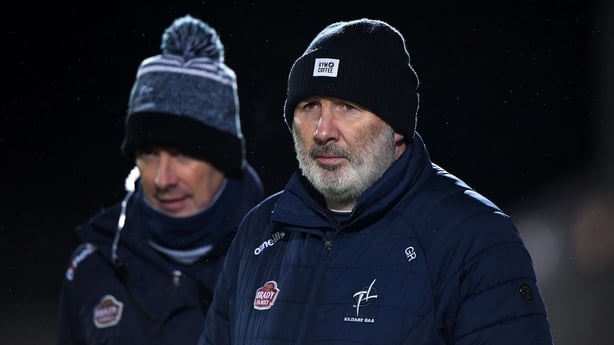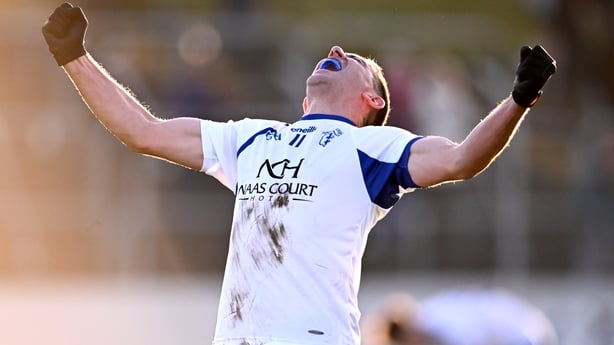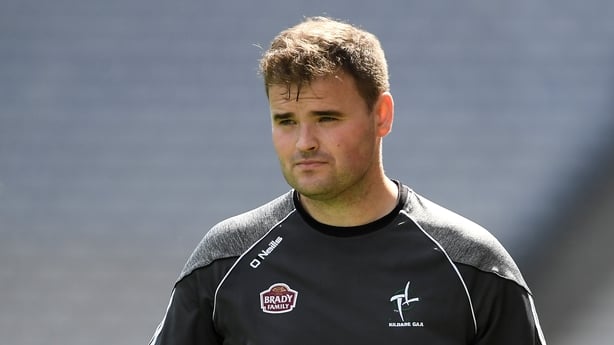We're only approaching mid-February and Kildare are in trouble again.
Their margin for error in the nerve-shredding Division 2 whittled down to almost nothing.
If it sounds familiar, that's because it is. Kildare were in more or less the same quandary at this exact stage last year, after taking a battering at home to Cork.
Yes, there was another inquest after that one. The 'why aren't Kildare better than they are' article is a regular staple.
The team's form prompted a stern warning at county board level this week. Chairman Mick Gorman told their February meeting that he had made clear to Glenn Ryan that results were "not good enough."
One delegate from Sallins was inclined to attribute recent performances to "a lack of fire in the bellies" and - in an echo of Martin McHugh's previous diagnosis of Meath's ills - lamented that there was a sorry preponderance of desk jobs in the county.
"If my poor dad was still alive he would be saying the same thing what he said back years ago that 'since 1935 the ploughman that used to play the game is no longer there, they are now all collar and tie,'" Sallins delegate Tom Cross was quoted as saying in the Leinster Leader on Wednesday.

Kildare's continued failure to 'ignite' is one of the perpetual sorrows of the Leinster football championship and a puzzler to outsiders.
Broken down, the county would appear to have all the elements necessary to become a Gaelic football powerhouse.
Kildare are the reigning under-20 All-Ireland football champions, also winning the title in 2018. In 2022, they reached another decider at the age-grade, losing to another Canavan-inspired Tyrone team.
The current team boasts huge amounts of raw athletic potential and a squadron of forwards that is arguably superior to anything Kildare have enjoyed before - certainly better than Micko's attack. Daniel Flynn, Ben McCormack, Darragh Kirwan, etc.
To those who remember the late 1990s - a much cherished era among Gaelic football people - Kildare will always be perceived as a football mad county, as demonstrated by the crazy hype train that took off that summer.
It made Mayo's All-Ireland build-ups look sedate and reserved. It culminated in the then Minister for Finance announcing that their All-Ireland semi-final win over Kerry was "better than sex".
In the eyes of many, the hype damaged Kildare in the final itself - the only Kildareman vox-popped on 'A Year Til' Sunday' was a jovial captain of industry type who told Pat Comer's cameraman that it was "just a mather a' toggin' out" - though a more dispassionate view was that their forward line was just too pedestrian compared to Galway's.
Introducing census data into this debate comes with plenty of caveats and variables.
Between the 1991 census and the most recent census in 2022, every county in the country has seen population growth but none more so than Kildare. In fact, their population has more than doubled, going from 122,656 to 247,774 in that span.
The county is now the seventh most populous on the island and fourth in the Republic. And in the three counties with bigger numbers north of the border - Antrim, Down and Derry - approximately half of each is a GAA wasteland for obvious reasons.
In the mid-80s, Kildare still had a lower population than both Kerry and Donegal - now it comfortably exceeds both. Going back further, to the 1960s, Louth, Mayo, Clare, Tipperary and Wexford had more people than Kildare. Nowadays, none are even in the same ballpark.
We've seen evidence of its impact.
Naas, previously dismissed as a rugby and horse racing environment and which traditionally lagged well behind Newbridge in Gaelic football terms, has emerged as a GAA stronghold in the 2020s, largely sparked by inward migration.

While they fell short in two provincial deciders against Kilmacud Crokes in recent years, Kildare clubs are the current holders of the Leinster intermediate (Allenwood) and junior (Milltown) provincial titles.
That's before you consider the promise evident at schools level, where Naas CBS have monopolised the Leinster colleges championship in recent years, winning four of the last five. In 2022, they beat Maynooth EC in an all-Kildare final.
Perhaps Kildare's problem is not fully realising what they've become. According to critics in the county, Kildare have an identity crisis and are still carrying out their business like a Leinster also-ran.
Unlike the hated evil empire on their eastern flank, they haven't installed a CEO or a commercial manager at county board level, though they do have a full-time official in the shape of an operations manager.
On the evidence of 2023, Kildare aren't spending like an elite county, though in some quarters this would elicit kudos. According to Colm Keys' figures in the Irish Independent, Kildare were 24th out of 32 counties in their spend on their inter-county teams in 2023.
The spend on the redevelopment of St Conleth's Park is presumably diverting funds from the county set-up. (Though that begs the question - how did one of the biggest and wealthiest counties in the country have such a puny and dilapidated county ground until so recently? The fact that almost all their big championship games until recently have been re-located to Croker may be some mitigation.)
For most of their existence as a Gaelic football county, Kildare occupied the same orbit as Laois, Louth, Westmeath et al.
They are frequently twinned with Meath as the sick men of the would-be elite.
But the two counties have very different histories. Footage of Meath playing well is unfortunately mainly confined to Laochra Gael at this stage. Kildare, however, have far less cause to harp on the good old days.
Back in the ploughman's heyday, they won four All-Ireland titles, the last coming in 1928. This winning tradition vanished over the subsequent decades as the county descended towards mediocrity.
Since 1935, Kildare have won just three Leinster titles, a paltry tally. In the landmark year of '98, there was great euphoria at bridging the 42-year gap, though the 1956 victory was not the swansong of a glorious era but an isolated triumph itself.
They were competitively dormant in the 1980s, when two of the most talented footballers they've ever produced were winning All-Irelands with another county.
Larry Tompkins and Shea Fahey fell out with Kildare in a row over expenses. The former swore he would never play for Kildare again after he claimed they refused to pay his return fare to New York after the 1985 Leinster championship loss to Meath. The county board insisted they had but that the fare had been more than they were informed - but they paid it anyway.
Five years later, Kildare men contributed 0-08 for the winners Cork in an All-Ireland final which finished 0-11 to 0-09. The same season, Kildare were eliminated by Wicklow in the Leinster quarter-final in Aughrim, a match that generated another wave of ructions at county board level.
Micko's arrival in the 1990s gave Kildare a status they didn't previously enjoy. In contrast to the '80s, the 1990s was a high-octane decade of striving and achieving and ultimately heartbreak. It's telling that in Dwyer's two-year sabbatical - as he called it - in 1995 and 1996, their performance declined dramatically, with first round exits to Louth and Laois.

It should have kick-started a new normal but after the 2000 Leinster title win and Micko's departure a year later, Kildare gradually retreated to irrelevance by the mid-noughties.
Since then, only the McGeeney years and the 'Newbridge or Nowhere' campaign in 2018 have generated much excitement.
They sought out Kerry managerial royalty again at the turn of the decade. Jack O'Connor's two-year stint, impaired by Covid and concluding on a slightly sore note, was not received rapturously by the Kildare support but he did leave them in Division 1 after all. (The 2021 Leinster final loss to Dublin, in which Jacko was derided for timidly defensive tactics, was also placed in a flattering light after they gave up 5-17 at the same stage the following year...)
Meanwhile, Davy Burke, the 2018 All-Ireland winning U20 manager, abruptly quit the Kildare scene after a fallout with the county board and finds himself in Roscommon, an over-performing outfit. Despite the fallout, Burke did tell the Our Game podcast in 2022 that the Kildare job is "the most exciting in the country."
After O'Connor abruptly but understandably abandoned them for his native county, Kildare turned to a crack team of former playing legends.
The 2022 league garnered them acclaim and a very rare win over an off-colour Dublin but still ended in relegation.
Two years on, they're staring down the barrel of Division 3.
The consensus from the first two league games is that Kildare have been confused in their approach. Caught between a half-hearted attempt at a pressing game, while trying to retain an extra man in defence. As a result, their poorly resourced press is futile and they're allowing teams an easy overlap coming out of defence.
Kildare Nationalist journalist Richard Commins has cited the damning statistic that Cavan and Fermanagh defenders have racked up a combined tally of 2-08 across their two league games and the O'Byrne Cup loss to Wexford, indicating a lethargy around tracking runners.
Worse again is their amazing lack of goalscoring threat. Since the win over the Dubs, the Kildare have found the net in just one of their last 12 league matches - a three-goal haul against whipping boys Limerick last spring. Things weren't much better last summer, mustering just two goals in six championship games.
Even if they do slip into Division 3, they may yet avoid the Tailteann Cup after winding up with a relatively benign Leinster SFC draw - which is to say, Dublin are on the other side. Still on current form, a quarter-final against Westmeath or semi-final against Louth would be extremely dicey affairs.
For Kildare, a spin in the second tier competition would be a stinging rebuke. Despite all their abundant potential and the natural advantages that demography has bestowed, they're still somehow cast in the role of Leinster also-ran.
Watch highlights on Allianz League Sunday on RTÉ2 and RTÉ Player from 9.30pm, follow a live blog every Sunday afternoon on rte.ie/sport and the RTÉ News app and listen to live updates on Sunday Sport


